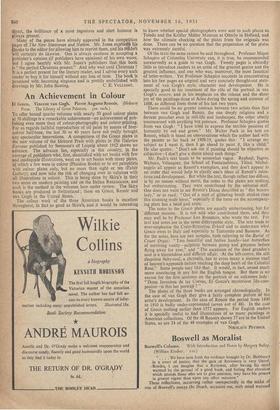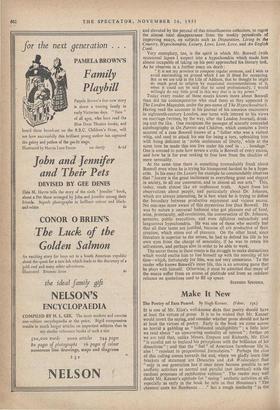Boswell as Moralist
Boswell's Column, With Introduction and Notes by Margery Bailey.
(William Kitnber. 21s.)
46 . We have seen from the evidence brought by Dr. Shebbeara in a court of justice, that the gain of Reviewers is very liberal. 'Besides, 1 can imagine that a Reviewer, after having his mind warmed by the perusal of a good book, and feeling that elevation which attends those who are to give sentence, may have his powers in greater vigour than upon any other occasion." These reflections, occurring rather unexpectedly in the midst of one of Boswell's essays On Death, occasion me, with mind warmed and elevated by the perusal of this miscellaneous collection, to regret the almost total disappearance from the weekly periodicals ot improving essays, on subjects such as Disputation, Living in the Country, Hypochondria, Luxury, Love, Love, Love, and An English Cook.
Very exemplary, too, is the spirit in which Mr. Boswell (with occasional lapses I suspect into a hypochondria which made him almost incapable of taking up his pen) approached his literary task. As he observes in a further essay on death : It is not my province to compose regular sermons, and I wish to
avoid encroaching on ground which I am ill fitted for occupying. But as we are told in the Life of Addison, that he thought he might do much good to religion by occasional recommendations of it, when it could not be said that he acted professionally, I would willingly do any little good in this way that is in my power." Today every reader of these essays knows more about Boswell than did his contemporaries who read them as they appeared in The London Magazine, under the pen-name of The Hypochondriack. Having read the accounts in his journal of his amorous encounters in eighteenth-century London, one turns with interest to his views on marriage (written, by the way, after the London Journal), drink- ing and the like. One recognises the passages of scarcely concealed autobiography in On Parents and Children, which contains a lively account of a case Boswell knows of a "father who was a violent whig, and used to attack his son for being a tory, upbraiding him with being deficient in noble sentiments of liberty,' while at the same time he made this son live under his roof in . . . bondage." One is amused to note how severe a critic is Boswell of every excess, and how he is for ever seeking to free love from the shackles of mere sensuality.
At the same time there is something irremediably frank about Boswell even when he is trying his transparent hardest to be a hypo- crite. In his essay On Luxury for example he commendably observes that "luxury is the great incitement to everything great and elegant in society, to all our commerce, and to almost all our arts." This,
today, reads almost like an unpleasant truth. Apart from his observations about people, and particularly about Dr. Johnson, which are always interesting, he is best when he is trying to define the boundary between productive enjoyment and vicious excess. No onecwas more aware of this mysterious line than Boswell. He was by nature a universal hedonist who got pleasure out of food, wine, promiscuity, self-revelations, the conversation of Dr. Johnson, sermons, public executions, and even delicious melancholy and languorous hypochondria. He was one of those who secretly feel that all their tastes are justified, because all are productive of their creation, which stems out of pleasure. On the other hand, since literature is superior to the senses, he had to defend his life in his own eyes from the charge of sensuality, if he was to retain his self-esteem, and perhaps also in order to be able to work.
The secret theme in these essays is the struggle to make distinctions which would enable him to line himself up with the morality of his time—which, fortunately for him, was not very censorious. To the reader wtio knows Boswell's inner life, this is an amusing game that he plays with himself. Otherwise, it must be admitted that many of the essays suffer from an excess of platitude and from an indolent reliance on quotations used to fill up space.
STEPHEN SPENDER,















































































 Previous page
Previous page